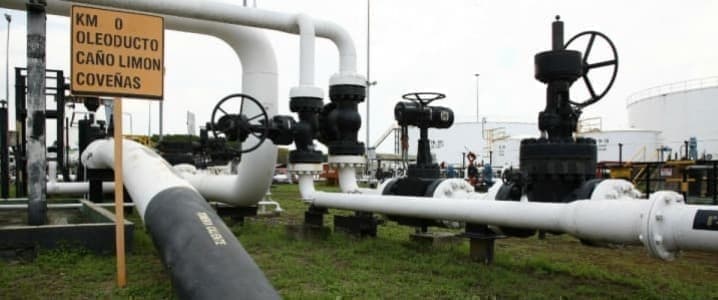Colombia remains one of most likely candidates to stop producing oil. Not because of environmental concerns or renewables energy taking over, the reason is much more prosaic – it would run out of crude. Thanks to an extensive appraising drive in the 1990s, Colombia’s proven crude reserves at some point totalled 3.2 billion barrels, however the gradual wearing thin could not be stopped, even the relatively recent exodus of Venezuelan oil specialists postponed the moment of depletion but never really cancelled it. Colombia’s Mines and Energy Ministry proudly stated that its reserves-to-production ratio did not sink any lower in 2020 and stagnated at around 2 billion barrels (equivalent to 6.3 years of production) yet this was largely on the back of lower production throughout the COVID-stricken year, not new discoveries being made.
The risk of seeing its own crude reserves depleted soon looms large on the agenda of Colombian authorities and for obvious reasons Bogotá has been mulling shale opportunities for quite some time already. Expected to be a pioneering moment for the Latin American nation and its Middle Magdalena Basin in particular, Colombia’s first-ever shale exploration tender that took place in November 2020 failed to impress. Despite rumours of US shale majors taking a close look at the bids on offer, it was only the national oil company Ecopetrol that did present an offer. ExxonMobil, along with ConocoPhilips, were the biggest market players rumoured to be looking into Colombian opportunities. It took ExxonMobil a bit more than six months to commit to Colombia’s shale and thus become the first foreign company to be launching a fracking-pertinent project in the country. Related: A Scorching Hot Middle East Summer Could Send Oil Prices Soaring
ExxonMobil paid $53 million to land the Platero research project in the Middle Magdalena Basin.
Apart from being the home of Colombia’s first-ever producing field, the La Cira-Infantas all the way back in 1918, the given region is now home to the smaller Magdalena crude stream. With a century-long history of oil extraction and all necessary infrastructure available for future drillers, the Middle Magdalena region is also fervently pro-trade union, being the headquarters of the USO syndicate. According to assessments cited by Ecopetrol, the Middle Magdalena Basin contains some 4-7 billion barrels of oil and some 3 TCf of natural gas. Above and beyond the official wooing of Western majors, Ecopetrol has been trying its best to get as much shale exposure as possible. It partnered with US firm Occidental Petroleum so that it can get first-hand experience from the Permian Basin on hydraulic fracturing.
Thus, in spite of a relatively liberal government that seeks foreign investment, solid expertise and available infrastructure within the country, Colombia’s shale projects are still years away from being commissioned. The most recent factor stymieing progress further can be linked to nationwide protests taking over the streets the country, railing against the Duque Administration seeking a tax increase on individuals and businesses alike, to the extent of $6 billion. The government is quite clear about its intentions with the tax hike – it wants to generate enough revenues to keep its investment grade debt rating, an endeavor that Colombia’s rural populace believes to take place at its immediate expense. Poorer regions, the condition of which was rendered even more precarious by the coronavirus, wasted no time in expressing their ire vis-à-vis the government. Related: $100 Oil Predictions Soar As Analysts Warn Of Supply Crisis
Simultaneously to the ongoing protests, many inside Colombia’s political class are having qualms whether shale technologies should be buttressed, considering their questionable environmental impact. The Colombian attorney general’s office wanted to derail the existing shale legislation in place, arguing that utilizing fracking technologies is incompatible with the country’s long-term environmental ambitions. Bogotá pledged to become net-zero by 2050, pushing forward with its concurrent agenda of decarbonization and reforestation. In contrast to major oil producers, Colombia would find it relatively easy to decarbonize as its reserves are at an immediate risk of depletion still within the 2020s. Such a scenario, however, would leave the national oil company Ecopetrol between a rock and a hard place – net profit halved year-on-year in 2020, reaching $0.47 billion, whilst the company needs funds for its ambitious portfolio of organic investments in the first half of the 2020s.
What is there to do for Colombia? Well, oil production makes up some 4% of Colombia’s GDP and over 45% of the country’s exports. Losing such a chunk of the economy would be swiftly felt by politicians and the populace at large, a realization that loomed large with President Duque (who pledged not to support fracking when running for presidential office in 2018). The prudent way going forward would be to conclude deals with Western majors now, when the presidency is indeed under pressure yet still not as intense as it would be once campaigning for the May 2022 presidential elections kicks in. Any shale deal would be inevitably met with distrust; therefore, they need to be sweetened for the locals, providing them with a material incentive to see the connection between the survival of oil industry and their own well-being. Once this is done, the Colombian authorities will be facing the hardest task of them all – ensuring that the covenant is upheld, pipeline explosions or sabotage attacks notwithstanding.
By Gerald Jansen for Oilprice.com
More Top Reads From Oilprice.com:
- Oil Could Reach $80 This Summer, But There’s A Catch
- Russia Expands Its Influence In Major Iraqi Oil Fields
- China’s Oil Imports To Drop After Refinery Margins Near $0

















